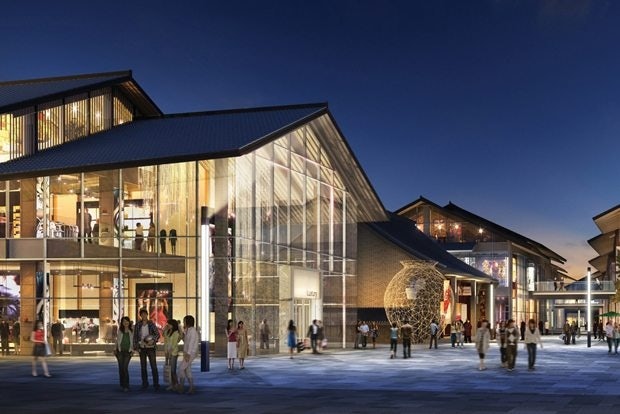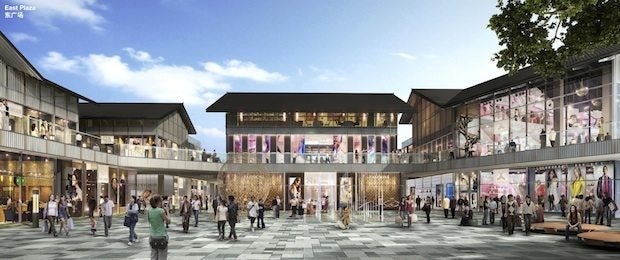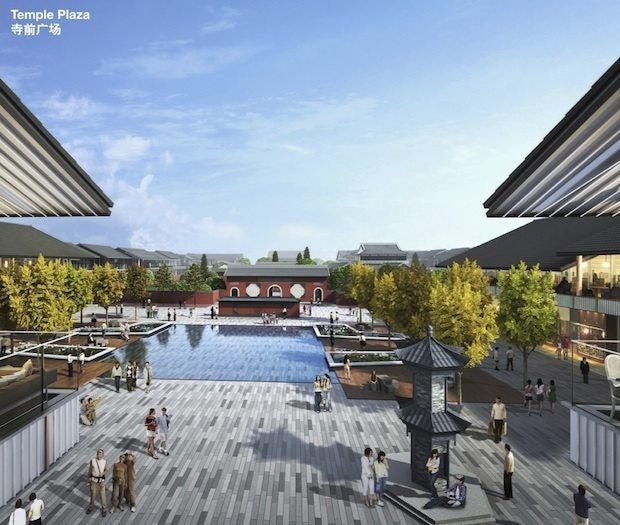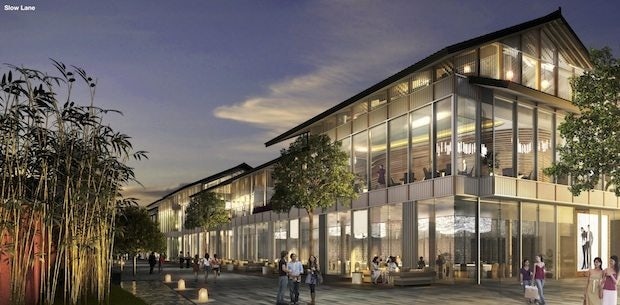
A rendering of the Swire Daci Temple Project now underway. (Swire Properties)
Chengdu has a plethora of new real estate developments and it would be a fool’s errand to try to cover them all. Occasionally a project comes along, however, that deserves a closer look. Just last year, Chengdu's New Century Global Center made headlines as the largest building in the world. While these Guinness Book of World Record superlatives are important for the ambitious Chinese government official, we evaluate projects based on how much they will impact the overall development and composition of commercial space around the city that we call home. For that reason, it is worth diving deeper for a glimpse into the much-anticipated Daci Temple Project.
The Daci Temple Project is a joint venture between British-background, Hong Kong developer Swire Properties, and Chinese construction company Sino-Ocean Land. The downtown plot covers a more than 250,000 square-meter footprint of mixed-use space and is set to open in the third quarter of 2014. Wrapping around the existing Buddhist Daci Temple in the city-center of Chengdu, the project features a low-rise, pedestrian-style retail shopping area with intimate lanes, a boutique hotel, serviced apartments, and an office tower. The lanes and buildings of the retail component are designed to match traditional Sichuan architecture styles. The developers also aim to assure the restoration and preservation of existing heritage structures associated with the original temple.
The mixed-use complex is located in a prime spot in Chengdu's busiest shopping area. It lies adjacent to the newly opened Wharf IFS project and will establish the eastern border of the new Chunxi Road Pedestrian shopping area, officially extended by the JinJiang District government. When completed later this year, shoppers will come streaming to the area from a new subway plaza on top of the Chunxi Road station. The Chunxi Road shopping area does not let cars pass through, so more than 1,000 underground parking spaces support the development in this high-traffic area.

One only has to walk the world's best shopping areas in Paris, Milan, and New York to recognize the common denominator of success: well-networked, high street retail. Swire aims to recreate this whole-day shopping and entertainment experience in Chengdu by providing everything a modern Chinese consumer could possibly need or want in one complex while maintaining the quaint feel of a boutique-lined side street. The project's design team focused on creating an environment that would attract and retain consumers, and the leasing team set ambitious targets for brands that are not yet in Chengdu.
Those familiar with Beijing's Sanlitun Village, also called Taikoo Lanes or Taikoo Li, can begin to picture the Chengdu equivalent. A network of lanes will feature two- and three-story buildings offering retailers duplex and triplex storefronts. Just like the massively successful Beijing shopping area, also owned and managed by Swire, the Chengdu Daci Temple project aims to attract popular anchor retailers like Apple, Abercrombie & Fitch, Adidas, and Hollister for the rising middle class in this Western China metropolis. Luxury tenants promise to impress with flagship stores from Gucci, Cartier, Hermès, and Jimmy Choo, among others.
A big difference from the Sanlitun project, however, is that Swire designed the Chengdu project from the beginning, while the Beijing project was purchased from its original developer. Swire has stated that it will apply what it learned from a disconnected North and South Village and lackluster support facilities in Beijing with the goal of ensuring that Chengdu's project properly funnels foot traffic and management of the buildings run smoothly. Importantly, a deck runs between all the buildings on the second floor, so retailers not on the ground floor will see some traffic and the property's managers can better dictate the nightlife crowds that are expected to flow to the project. Its positioning will reflect Shanghai Xintiandi-style after-work drinks instead of RMB15 student shooters.

On top of the fashion retail, Chengdu eating options will be available for both expats and locals in the project covering food, beverage, and the dessert categories. Chengdu will join the ranks of other expat-heavy cities that boast Element Fresh, a popular Western-style eatery. Perhaps more important than Jones Lang LaSalle's announcement in China's 50 Cities report, the appearance of Element Fresh will provide concrete evidence that Chengdu has officially graduated to China's “Tier 1.5” city status. Other offerings in a gastronomical tour around the world, including Thai, Cantonese, American, French, Italian, and more, will offer new options to complement the spicy dishes and hotpot of Sichuan food as Chengdu engages the world.
The opening of Swire's Daci Temple complex will mark an important shift in Chengdu's retail landscape, moving the city into the third phase of retail development. As recently as early 2010, Chengdu residents seeking foreign products had to sift through a limited selection at department stores. The opening of the Galleria at the end of 2010 kicked off the next phase of retail development, featuring Western-style shopping malls. To say developers went crazy would be an understatement as Chengdu retail space skyrocketed from 1,000,000 to 8,000,000 square meters in just four years. Better suited for suburban America, the shopping mall found early success in Chengdu by offering new brands and consolidated food options. Now, new shopping centers that wish to copy this model, especially outside of traditional retail areas, will struggle to lease space amidst the glut in supply.
The Swire Daci Temple project hopes to separate itself from the pack with a prime location and cozy lane layout aimed at appealing to the traditionally slower-paced lifestyle of Chengdu people. Additionally, many brands that wanted to come to Chengdu for its ripe retail market but were waiting for the right project now have their chance. Brands rumored to be venturing to Western China for the first time include Stella McCartney, Y-3, Leica, Hollister, Victoria's Secret, and peers.
Swire hopes to draw them to the "compact" retail offering of 100,000 square meters in which all above-ground locations have been strategically located. The Taikoo Lanes plans to set a new standard for Chengdu shopping, forcing other projects to adapt or die.

Beyond the retail, the multi-use complex features a 100-room boutique hotel called the Temple House. It is an expansion of boutique hotels managed in China that began with success of the Opposite House in Beijing and will also be managed by Swire. Just off the boutique hotel are serviced apartments that offer long-term accommodation and share the amenities of the Temple House. The check-in lobby of the hotel is a converted temple structure that will take guests back in time and offer a relaxing atmosphere in the heart of the bustling city. Further down on DongDa Street is the Pinnacle One, the 107,000 square-meter office tower, which has been sold to a financial fund.
While Swire and their partner Sino-Ocean Land have taken every precaution to open with a bang, they also face some challenges. One noticeable problem presents itself when walking towards the project from the DongDa Street. Between the busy east-to-west thoroughfare and Daci Temple project is an old, rundown apartment complex that presents quite the eyesore. It will be interesting to see what retailers along that edge do with this juxtaposition of old and new China.
Retailers who choose to open at Daci Temple’s Taikoo Lanes will feel pressure with some of the highest rents in their China portfolio. Coupled with some of China's highest property management and marketing fees, high store sales will need to make the arrangement financially sustainable for retail tenants. As a result of the high overhead charges, Swire will also be under pressure to deliver strong levels of foot traffic to its tenants’ storefronts.
While Swire is among the best retail operators in mainland China, they have been accused of focusing too much on maximizing the financial return of assets. This sometimes can come at the expense of long-term relationships and difficult renewal situations for retailers after a quick three-year contract and hundreds of thousands of RMB in capital expense costs.
And alas, that brings us back to today where cranes and work crews hammer away and the Daci Temple project begins to rise above the construction-walled perimeter. Now over 80 percent leased, Swire's team shifts to take on the role of maestro as it attempts to orchestrate a successful opening this fall. That is no small feat with each brand requiring its own design, construction, and distribution of its products to a new store. No matter how many stores open that fall day, however, we cannot wait to wander the lanes and watch how Taikoo Li lifts Chengdu retail to a whole new level.
Robert Butler is a project manager at Maxxelli Consulting. From the company: “Maxxelli Consulting partners up with brands owners to kick-start their retail operation in China. This includes: positioning brands on the Chinese market; selecting the ideal location; and negotiate with developers to get the best deal; setting up your Chinese company and running your marketing campaign. We believe in excellent opportunities for foreign businesses in China. We partner up with people or organizations that have a visionary idea, product, or service and grow their businesses. Through our local networks, expertise, and hard work, Maxxelli Consulting drives projects to success.”